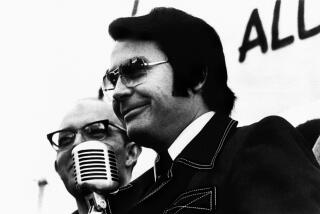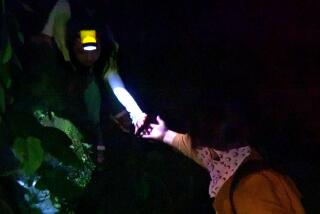Review: In ‘The Devil and Father Amorth,’ William Friedkin finds and films a real exorcist
- Share via
There are no rotating heads or spewing green goop on display, but “Exorcist” director William Friedkin’s documentary, “The Devil and Father Amorth,” serves as a curious companion piece to his 1973 horror classic and has its own chilling, if limited, charms.
“At the time I made ‘The Exorcist,’ I had never witnessed an exorcism,” admits host-narrator Friedkin, who more than four decades later would correct the oversight when granted permission to film then 91-year-old Father Gabriele Amorth, the chief exorcist of the Diocese of Rome since 1986, perform the ritual purging on a seemingly possessed woman named Cristina.
There were conditions to be met — Friedkin wasn’t allowed to bring in a crew or lights — but was otherwise permitted to film Cristina’s ninth and final exorcism (the affable Father Amorth died shortly afterward), during which she would writhe and growl like a caged animal.
Friedkin pads out the main attraction with archival commentary by author William Peter Blatty, revisiting the infamous “Exorcist” steps in the Washington, D.C., neighborhood of Georgetown, and engaging neurosurgeons in a dialogue on demonic possession versus dissociative identity disorder.
While the slim sampler platter would be more at home on an “Exorcist” commemorative DVD release, the documentary, accentuated with unnerving bursts of music sampled from the works of neoromantic composer Christopher Rouse, should placate the rabid fan base.
-------------
‘The Devil and Father Amorth’
Not rated
Running time: 1 hour, 8 minutes
Playing: Ahrya Fine Arts, Beverly Hills
See the most-read stories in Entertainment this hour »
Movie Trailers
More to Read
Only good movies
Get the Indie Focus newsletter, Mark Olsen's weekly guide to the world of cinema.
You may occasionally receive promotional content from the Los Angeles Times.










